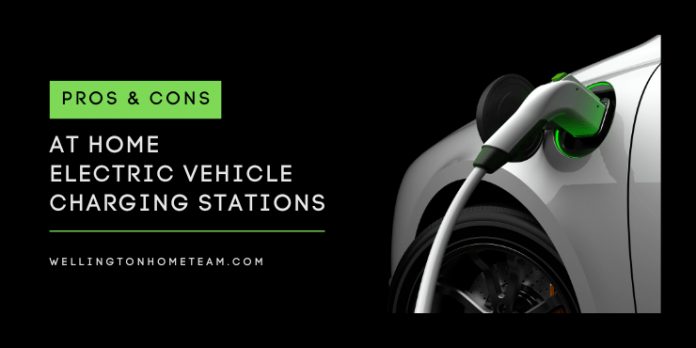At Home Electric Vehicle Charging Station | Pros & Cons
As the world moves towards a greener future, the demand for electric vehicles (EVs) has steadily increased. With this surge in EV ownership comes the need for convenient charging solutions. One such solution can be adding an electric vehicle charging station at home, but is it a wise decision? In this guide, we’ll explore the pros and cons of having an electric vehicle charging station at home.
What is an At-Home Electric Vehicle Charging Station?
An at-home electric vehicle charging station, also known as Electric Vehicle Supply Equipment (EVSE), is a device installed in your home that allows you to recharge your electric vehicle’s battery. It’s like having a fuel station at your house but for electric cars.
Different Types of At-Home Electric Vehicle Charging Stations
There are many different types of at-home charging stations, similar to having different fuel options for gas cars. Here are the most common electric vehicle charging stations for your home.
Level 1 Charging StationThese are basic chargers that plug directly into a standard household outlet. They provide a slow charging rate, typically adding around 2-5 miles of range per hour of charging.
Level 2 Charging StationThese chargers require a dedicated 240-volt circuit and offer faster charging speeds compared to Level 1 chargers. They are commonly installed at homes and can add around 10-60 miles of range per hour of charging, depending on the vehicle and charger specifications.
Smart Charging StationsThese chargers come with advanced features such as Wi-Fi connectivity, smartphone integration, scheduling capabilities, and energy usage monitoring. They allow users to remotely control and monitor charging sessions for added convenience and efficiency.
Fast Charging StationsAlso known as Level 3 or DC fast chargers, these stations deliver high-power DC electricity directly to the vehicle’s battery, enabling rapid charging. They are typically found in public locations but can also be installed at homes with compatible EVs. Fast chargers can add significant range to an EV in a short amount of time, making them ideal for long-distance travel or quick top-ups.
Portable Charging SolutionsWhile not permanent fixtures, portable EV charging solutions allow for on-the-go charging and can be used at home or when traveling. These include portable charging cables that come with electric vehicles or standalone portable chargers that can be plugged into various power sources.
Pros of At-Home Electric Vehicle Charging Stations
1. ConvenienceOne of the primary benefits of having an EV charger at home is the convenience it offers. Instead of relying solely on public charging stations, which may be crowded or inconveniently located, you can simply plug in your vehicle whenever it’s parked at home.
2. Cost SavingsCharging your electric vehicle at home is often more cost-effective than using public charging stations or traditional gasoline. Many utility companies offer discounted electricity rates for EV charging during off-peak hours, further reducing your overall energy expenses.
3. Increased Home ValueInstalling an EV charger can enhance the value of your property, especially as the demand for electric vehicles continues to rise. However, only if the unit is paid off and the buyer has an EV vehicle otherwise it becomes a non-factor.
4. Environmental ImpactBy opting for electric vehicles and installing a charger at home, you’re contributing to reducing greenhouse gas emissions and promoting sustainability. EVs produce zero tailpipe emissions, helping to improve air quality and mitigate climate change.
5. Tax Incentives and RebatesDepending on your location, you may be eligible for various tax incentives, rebates, or grants for installing an EV charger at home. These incentives can help offset the initial cost of purchase and installation, making it a more financially viable option.
Make an informed decision and explore the advantages and disadvantages of installing an electric vehicle charging station at home. #ev #electricchargingstation
Cons of At-Home Electric Vehicle Charging Stations
1. Upfront CostWhile the long-term savings and benefits are significant, the initial cost of purchasing and installing an EV charger can be relatively high. However, with the availability of incentives and rebates, the upfront cost can be mitigated to some extent.
2. Space RequirementsDepending on the type of charger you choose, you may need adequate space for installation, particularly if you opt for a wall-mounted unit. Consideration of space and location is essential to ensure convenient access and compliance with safety regulations.
3. Potential Electrical UpgradesDepending on your home’s electrical system, you may need to upgrade or modify it to accommodate the installation of an EV charger. This could involve installing a dedicated circuit, upgrading your electrical panel, or rewiring certain areas of your home, which may incur additional costs.
4. Limited PortabilityUnlike portable charging solutions, such as charging cables that come with electric vehicles, home EV chargers are typically fixed installations. While this provides convenience and reliability, it also means you cannot easily take it with you when moving or traveling.
5. Dependence on Electricity
While electric vehicles offer environmental benefits, they still rely on electricity, which may predominantly come from non-renewable sources in some areas. However, as renewable energy sources continue to expand, the environmental impact of charging EVs will further diminish.
Final Thoughts
Investing in an electric vehicle charger for your home is not only a practical decision but also a smart financial and environmental investment. By offering convenience, cost savings, and environmental benefits, an EV charger can enhance the value of your property and attract discerning buyers.
With the continued growth of the electric vehicle market, now is the perfect time to future-proof your home and contribute to a cleaner, greener tomorrow. If you’re ready to take the next step towards sustainable living and increased property value, consider installing an electric vehicle charger today.
Please consider spreading the word and sharing; At Home Electric Vehicle Charging Stations | Pros & Cons
Make an informed decision and explore the advantages and disadvantages of installing an electric vehicle charging station at home. #ev #electricchargingstation
About the Author
Top Wellington Realtor, Michelle Gibson, wrote: “At Home Electric Vehicle Charging Stations | Pros & Cons”
Michelle has been specializing in residential real estate since 2001 throughout Wellington Florida and the surrounding area. Whether you’re looking to buy, sell or rent she will guide you through the entire real estate transaction. If you’re ready to put Michelle’s knowledge and expertise to work for you call or e-mail her today.
Areas of service include Wellington, Lake Worth, Royal Palm Beach, Boynton Beach, West Palm Beach, Loxahatchee, Greenacres, and more.
At Home Electric Vehicle Charging Stations | Pros & Cons

